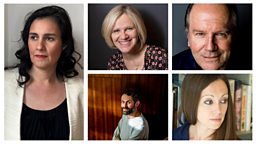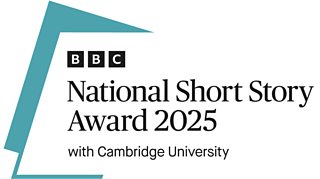Meet the 2025 Judges

DI SPEIRS (Chair)
Di Speirs has been a judge of the Βι¶ΉΤΌΕΔ National Short Story Award since its launch and is this year’s Chair of Judges. Di produced the first ever Book of the Week and has directed scores of Book at Bedtimes and short stories as well as dramas. As Executive Editor for Βι¶ΉΤΌΕΔ Audio she lead the London Readings team and was the Editor for Open Book and Book Club on Βι¶ΉΤΌΕΔ Radio 4 and World Book Club on the Βι¶ΉΤΌΕΔ World Service. She has been closely involved in the Βι¶ΉΤΌΕΔ National Short Story Award since its inception and been the returning judge on the panel. A regular literary judge including for the Wellcome Book Prize in 2017 and as chair of the International Dylan Thomas Prize in 2021, she has been a nominator twice for the Rolex Mentor and Protégé Arts Initiative (Literature) and is a board member of the Edinburgh City of Literature Trust. An Honorary Fellow of the Royal Society of Literature, in 2024 she was awarded an MBE for Services to Broadcasting and to Literature.
"I'm absolutely delighted to be chairing the 20th Βι¶ΉΤΌΕΔ National Short Story Award with a panel of unbelievably expert writers who all know the form intimately. All of us have judged the award before and I'm looking forward to the perspectives that brings. As the returning judge over two decades, I've seen how the short story has grown and flexed, found ways to reflect new characters and communities and to speak to younger and broader audiences. It remains always a challenging form, easily underestimated, but a great short story has the power to penetrate the heart. As ever I know I will be surprised and excited as I look for stories written with originality and freshness, with the power to move me and to linger."
KAMILA SHAMSIE
Kamila Shamsie was shortlisted for the Βι¶ΉΤΌΕΔ NSSA for her story "Churail" in 2023. She is also the author of eight novels, including Best of Friends, Burnt Shadows and Βι¶ΉΤΌΕΔ Fire which won the Women’s Prize for Fiction in 2018 and was long listed for the Man Booker Prize. A Vice President of the Royal Society of Literature, she grew up in Karachi, and now lives in London and in Doha where she is Writer in Residence at Georgetown University in Qatar. Her novels have been translated into more than 30 languages.
“Being shortlisted for the Βι¶ΉΤΌΕΔ NSSA in 2023 is one of the proudest achievements of my writing life. The short story form is so hard to get right, and so deeply satisfying when it works. I’m very much looking forward to reading the submissions where I expect to feel empathy for those who don’t quite get it right (I almost never do, though I’ve been writing short stories for decades) and admiration, sometimes touching awe, for those who know how to create a world and make it feel complete within just a few pages.”
WILLIAM BOYD
William Boyd is the author of 18 bestselling and prizewinning novels and 5 collections of short stories that have been published around the world and translated into over 40 languages. He is also a screenwriter. 20 of his screenplays for film and TV have been produced – including “The Trench” that he also directed.
Boyd was born in Ghana in 1952 and grew up there and in Nigeria. He was educated at Gordonstoun School and the universities of Nice, Glasgow and Oxford. He was a lecturer in English Literature at St Hilda’s College Oxford and is an honorary fellow of Jesus College, Oxford.
He is married and divides his time between London and South West France.
“The short story shows remarkable and enduring resilience as a literary form. Readers’ tastes still strongly favour it, despite it being harder and harder for short story writers to find publishing outlets. I look forward to this year’s competition proving that the short story is still alive and kicking.”
LUCY CALDWELL
Lucy Caldwell was born in Belfast and is the author of four novels, several stage plays and radio dramas, and three collections of short stories. Awards include the Rooney Prize for Irish Literature, the George Devine Award, the Dylan Thomas Prize, a Major Individual Artist Award from the Arts Council of Northern Ireland, the Βι¶ΉΤΌΕΔ National Short Story Award and the Walter Scott Prize for Historical Fiction. She is a Fellow of the Royal Society of Literature and the recipient of the EM Forster Award from the American Academy of Arts & Letters.
"The short story is a strange, magical, spellbinding form – for me, the best short stories cast a spell around you. While reading, your own world falls away and you’re in their thrall; you leave them dazed, and maybe a little changed. There is nothing I’m specifically looking for in terms of subject matter or style, but I know I’ll see, or rather feel it when I encounter it, that surefootedness, that commitment – whether sincere or wildly satirical, I’ll feel the hairs on the back of my neck rise, my breathing catch, feel the quality of my attention change – the story will have me, and I’ll go wherever it wants to take me. I can’t wait."
ROSS RAISIN
Ross Raisin is the author of four novels: A Hunger (2022), A Natural (2017), Waterline (2011) and God’s Own Country (2008). He won the Βι¶ΉΤΌΕΔ National Short Story Award with Cambridge University in 2024 for his story ‘Ghost Kitchen’. He also won Sunday Times Young Writer of the Year award in 2009, and in 2013 was named on Granta’s once a decade Best of Young British Novelists list. In 2018 he was awarded a Fellowship by the Royal Society of Literature.
He has written short stories for various publications, including Granta, Prospect, the Sunday Times, Esquire, Βι¶ΉΤΌΕΔ Radio 3 and 4, and in 2018 published a book for the Read This series, on the practice of fiction writing. Since 2010, Ross taught an in-demand 6-week fiction course for the Guardian Masterclass programme; he also teaches at the University of Leeds and, as a writer-in-residence, for the education charity First Story.
"When I judged this award for the first time, to the backdrop of the London Olympics, it was also the first time I had judged a literary prize of any kind. I still remember the excitement of looking at the cardboard box of stories on the carpet of my in-laws' living room; the promise of what I might find inside it. Reading those stories was a memorable, formative experience for me – one that I feel a rekindled excitement to pick up again."
-
![]()
The National Short Story Award 2025
Find full details of the 2025 National Short Story Award.

